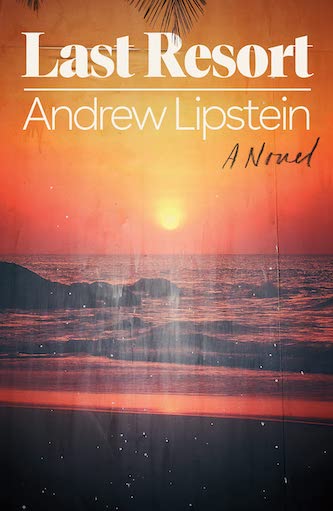Book Review: “Last Resort” — A Romp About Fiction, Riches, and Friendship
By Drew Hart
Make what you will of this often page-turning confection, which if not particularly literary, may be a bunch of fun.
Last Resort by Andrew Lipstein. Farrar, Straus and Giroux, 293 pp., $27.

Is “Metafiction” on its way out at this point? Seems, to your FC (Faithful Correspondent!), that less of this variety of literature is showing up lately. (Okay, Sheila Heti has a new book later this month; we’ll see?) However, we will probably always have writers writing about writers, if not about themselves, and novels within novels — and Last Resort, a debut effort from Andrew Lipstein, is a new and possibly entertaining one.
That the word “possibly” is in use here owes to the fact that your mileage may vary while consuming this effort; it probably will behoove one to have an exceptional interest in the trade publishing world, maybe advantageous to be a part of it. Perhaps you live in Brooklyn and are in editing or book publicity. Under those circumstances, this could be a lark.
Right. So this is a first novel about an ambitious young writer — our narrator is one Caleb Horowitz. When first encountered, he’s working for a tech startup in New York that has a clever plan to improve the payday loan business, although it’s not clear how. Straightaway we flash back; Caleb has previously been in advertising at a top agency, but leaves to move to Florida, hoping to write. A relationship with a woman there ends, and he heads for the West Coast to double down on his dream. In Los Angeles, he crashes with a college friend, a masters English candidate working as an adjunct instructor at UCLA; they spend an evening drinking. The friend, Avi, tells a tale of a trip he took to a Greek island, where he fell in love with an American girl on vacation. One day, the two meet another American couple who take them on a boat ride that ultimately strands them on an uninhabited island. There’s a lot of wine — and a lot of sex, of different varieties, that take place before they’re rescued. Back at their resort, Avi’s girl reveals that she came to Greece for a final fling — she’s on her way to Holland to be euthanized owing to an incurable brain tumor. She begs him to kill her, but he refuses … and then she has vanished.
Caleb’s visit to Avi is brief, but his story somehow triggers something; moving up to Oregon for a few months, he uses it as the foundation for a novel he writes — one with the same name as this one (see?) — returning to Brooklyn afterwards. The manuscript he brings home grabs the attention of a prominent Manhattan literary agent, who shops it with a host of publishers. The response? An industry bidding war. Meanwhile, Avi has become an assistant at a house that has been considering Caleb’s submission, and he happens to have read it. Avi confronts Caleb in a coffeehouse, accusing him of stealing intellectual property. The bidding for the book is approaching a million dollars (huge for publishing, if chicken feed elsewhere!) There’s obviously going to be a windfall, and it looks like Avi wants a piece of the action. Only no: he wants more — he wants to claim authorship, as it’s his story. With the stakes high, agents and attorneys assess the situation, and an agreement is cobbled. Avi’s name will go on the book — he’d only submitted it using a pseudonym since he was working for a publisher. And all of the money from the deal will go to Caleb…
Then it’s a year later and the novel is released. Caleb is living with a new girlfriend, Sandra (who seems somewhat irrelevant) in a cushy apartment, hosting lavish parties for friends who think he’s come into money when the payday loan startup he’d been working at was acquired by Wells Fargo. But money is never everything — he’s troubled by the way it’s all worked out. He’s reading the good reviews of his novel, attends a bookstore event for it, even though no one knows his role in what has happened. And he’s struggling with new writing ideas; his agent isn’t happy with concepts he proposes and drafts he submits. He’s haunted by his fate, feels jinxed, and regrets the choice he made — that he settled for the big money, gave up his identity as a literary star.
Have you read this far? If you’ve overlooked the plot conveniences and find Caleb’s neurotic writer monologues appealing (or empathize!), you may proceed to the final third of the book. In a cat’s cradle of a plot that untangles numerous threads, some more successfully than others, the story continues; your FC thinks there are too many spoilers to reveal, and will keep his mouth shut. Suffice it to say that ultimately our hero finds peace with himself, learning that his life can be larger than the one he’s been dreaming about.
Let’s leave it up to you to make what you will of this often page-turning confection, which if not particularly literary, may be a bunch of fun.
Drew Hart writes from Santa Barbara, CA.
